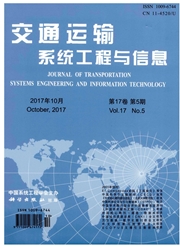

 中文摘要:
中文摘要:
区域公交调度是未来城市公共交通的发展趋势,主要解决如何合理统一安排最初分布于不同车场的车辆完成所有线路固定时刻表对应班次任务,从而减少车队规模和降低营运成本.考虑现实中许多突发事件干扰车辆按时完成班次,借助双层规划模型,本文探讨区域公交车辆调度和购车计划之间的有机联系,在满足多车型、车场容量限制、燃料限制等现实因素基础上,设计求解上下层模型的遗传算法,引入满意解的概念,将下层规划产生的一组满意解供上层规划比选,进而生成最佳公交车调度方案,以及与之对应的购车计划.最后给出了一个实例,验证模型和算法的正确性和有效性.
 英文摘要:
英文摘要:
Regional bus scheduling is the future trend in public transportation which deals with allocating trips belonged to several routes to buses located at different depots to reduce the size of bus fleets and operating costs. Considering many emergency events which may affect on-time vehicle arrivals, a bi-level programming model is applied to address the relationship between bus scheduling and its procurement scheme from an overall perspective. The model takes into consideration several constraints such as depot capacities, fueling, and emissions of polluting gases. Solutions to different situations of the upper and lower model are obtained by using a genetic algorithm. Based on some established criteria for a satisfactory solution, the lower solutions meeting the established criteria are generated for the upper model. Thereby, the best lower and the corresponding upper solutions are generated. Finally, an example is illustrated to prove the accuracy and effectiveness of our model and its algorithm.
 同期刊论文项目
同期刊论文项目
 同项目期刊论文
同项目期刊论文
 期刊信息
期刊信息
